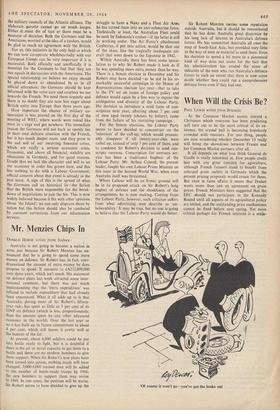Mr. Menzies Chips In
DONALD HORNE writes from Sydney :
• Australia is not going to become a nation in arms just because Sir Robert Menzies has an- nounced that he is going to spend some more money on defence. Sir Robert has, in fact, over- dramatised the amount of extra money he does propose to spend. It amounts to EA212,000,000 over three years, which isn't much. His statement on defence plans last week attracted some inter- national comment, but there was not much understanding that the 'extra expenditure' was inflated to include expenditure that had already been announced. What it all adds up to is that Australia, sluing most of Sir Robert's fif teen- Year rule, has spent as little as 3 per cent of its GNP on defence (which is less, proportionately, than the amount spent by any other advanced economy in the world). Over the last year or so it has built up its future commitment to about 4 per cent, which still leaves it pretty well at the bottom of the list.
At present, about 6,000 soldiers could be put into battle ready to fight, but it is doubtful if there is the air or naval capacity to get them to a battle and there are no Modern bombers to give them support. When Sir Robert's new plans have been turned into action, nothing much will have changed; 3,000-4,000 trained men will be added to the number of battle-ready troops by 1966; the new bombers to support them may arrive in 1969. In one sense, the position will be worse. Sir Robert seems to have decided to give up the struggle to have a Navy and a Fleet Air Arm; he has turned them into an anti-submarine force. Technically at least, the Australian Fleet could be sunk by Indonesia's cruiser—if the latter is still in working order. The Air Force's obsolescent Canberras, if put into action, would be shot out of the skies, like the tragically inadequate air- craft that went down to the Japanese in 1942.
Within Australia there has been some specu- lation as to why Sir Robert made it look as if he was spending more extra, money than he was. There is a Senate election in December and Sir Robert may have decided—as he did in his re- markably successful campaign in the House of Representatives election last year—that to take to the TV set on issues of foreign policy and defence would again be a fine way to expose the, ambiguities and disunity of the Labour Party. His decision to introduce a mild form of con- scription next year, affecting about 7 per cent of men aged twenty (chosen by lottery), came from the failure of his recruiting campaign.
For the Senate elections, the Labour Party seems to have decided to concentrate on the 'injustices' of the call-up, which would presum- ably disappear if all twenty-year-olds were called up,instead of only 7 per cent of them, and to condemn Sir Robert's decision to send con- scripts overseas. Conscription for overseas ser- vice has been a traditional bugbear of the Labour Party. Mr. Arthur Calwell, the present leader, fought his own Labour Prime Minister on this issue in the Second World War, when even Australia itself was threatened.
Where Labour will be on firmer ground will be in its proposed attack on Sir Robert's long neglect of defence and the shoddiness of the arrangements he is now making. Coming from the Labour Party, however, such criticism suffers from what advertising men describe as 'un- believability.' It may be true, but no one is going to believe that the Labour Party would do better. Sir Robert Menzies carries some reputation outside Australia, but it should be remembered that he has done Australia great disservice by his long lack of interest in Australia's defence forces. He has committed Australia all over the map of South-East Asia, but provided very little in the way of men or material to send there. Even his decision to spend a bit more in a piecemeal kind of way does not atone for the fact that his administration has eroded the sense of- initiative of the men who run Australia's defence forces to such an extent that there is now some doubt whether they could run a comprehensive defence force even if they had one.


































 Previous page
Previous page